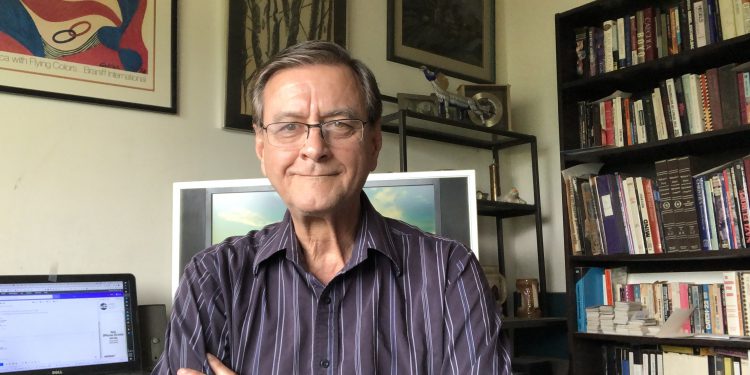What can PepsiCo, Coca-Cola, Unilever do right now about plastic pollution? Plug their marketing campaigns into an app ensuring their consumer plastic is recycled.
ZeLoop is already working with Nestlé in Dubai and launches a pilot this summer in Erie, Pennsylvania as a first step toward cracking the US market.
The process is so straightforward it’s hard to believe it’s not already widely in use. You choose a recycling location, take a photo of yourself depositing a plastic item into the correct recycling bin, and you’re rewarded in cryptocurrency.
Videos
- Which companies should be partnering with ZeLoop?
- How does ZeLoop encourage people to recycle?
Only 14 per cent of plastic is being recycled. It’s so prevalent in the environment that we are ingesting plastic at a rate of 250 grams a year.
According to the Break Free From Plastic Movement, Coca-Cola, PepsiCo and Nestlé were the three largest polluters of plastic in the world last year. Their output continues despite being members of The New Plastics Economy Global Commitment – an initiative supposed to reduce pollution.
“Startups are driven by people who think they can change the world”
ZeLoop USA co-founder Alberto Saavedra says, “When it comes to genuine sustainability action, startups are the answer. I worked for multinationals and they are just into staying in business and making a profit.
“Startups are driven by people who have ideas that they think can change the world. That’s where the action is going to take place.
“Some large multinationals are doing some things but let’s be very frank, whether it’s Amazon, Microsoft, Apple, whatever it is that’s influencing the economy right now, it was a startup in a garage some years back.
“ZeLoop was started by a group of Frenchmen in Dubai who were involved with plastic manufacturing companies and blockchain technology. Dubai is a key centre for this because oil is used to create virgin plastic. And it is becoming a technology leader.
“The trend towards a circular economy has been increasing in the last few years. And consumers are expecting brands to do much more about sustainability.
“Having said that, reducing plastic pollution is going to take time. There will be plastic bottles for years, ask Pepsi, ask Coca-Cola. But it is do-able, and we have to make a start.”
Eco-reward tokens are paid in Ethereum cryptocurrency
ZeLoop calls its incentive scheme Eco-rewards. At the moment, for each bottle recycled, app users receive 200 Eco-rewards tokens.
This is paid in Ethereum cryptocurrency, an established brand. At least two things will happen to the cryptocurrency – or Eco-rewards – collected in the app’s wallet by consumers. Firstly, the value of the currency is expected to rise. Secondly, marketing campaigns by partners including plastic producers and recyclers, will add value to the rewards through discounts on further products or allowing customers to donate their rewards to a non-profit.
“The idea is that cryptocurrency has to be given some value by enterprises and organisations that care about establishing the circular economy,” Alberto Saavedra says.
“The wallet part of the app keeps track of your collections and gives you a reward for bringing people onboard etc. There’s a little bit of gamification as well. But the idea is to involve consumers in the post-consumption process of the circular economy.
“Right now, 200 tokens is not worth very much. Once companies, organisations, municipalities, manufacturers, retailers get involved they start offering discounts and offering tangible rewards, then the rewards will have more value.
“Eventually we will recycle car batteries, car tyres, you name it”
“And you accumulate them. Like all cryptocurrencies it’s expected that the value will increase and eventually you’ll be able to convert that to regular money.
“We have about 8,000 downloads in about 40 countries. These are the early adopters. We have about 5,000 active users. It’s increasing every day.
“Eventually we will recycle car batteries, car tyres, you name it. The plastic recycling industry could be a $120 billion a year industry. It’s an evolving thing. There’s a lot to change in the recycling industry. Right now, it’s just not working.” A recent study said the industry is worth just $26.5 billion.
“I was concerned about plastic recycling 20 years ago,” he adds. “But now we have something that makes sense and this circular economy concept is starting to reach a critical mass as well.”
A next phase for the company could include an AI robot to help with sorting the various types of plastics at the recycling stage, which is a complicated business. Already AI is employed in verifying the image at the point of recycling to trigger the reward scheme.
“In 1974 I was approached by Steve Jobs to help him sell Steve Wozniak’s blue boxes”
Alberto Saavedra’s background in tech is a long one. “I programmed my first computer in 1972,” he tells us.
“By 1974 I was approached by Steve Jobs to help him sell blue boxes, which had been built by Steve Wozniak. That’s before Apple existed. Some people in Silicon Valley will tell you that’s how Apple got started. It was the blue box sales that Steve Jobs and Steve Wozniak were involved in.”
Blue boxes hacked the US telephone system to allow callers toll-free access to long distance phone numbers.
“I was selling these blue boxes that allowed students to phone their parents or their girlfriends back home,” he says. “There was money in it. Those blue boxes were selling for $450 each in those days, which is a lot of money, but long-distance calls were expensive.”
Maybe, turning his skills now to the legal life hack of recycling, could benefit all of us, by spelling the beginning of the end for plastic pollution.























